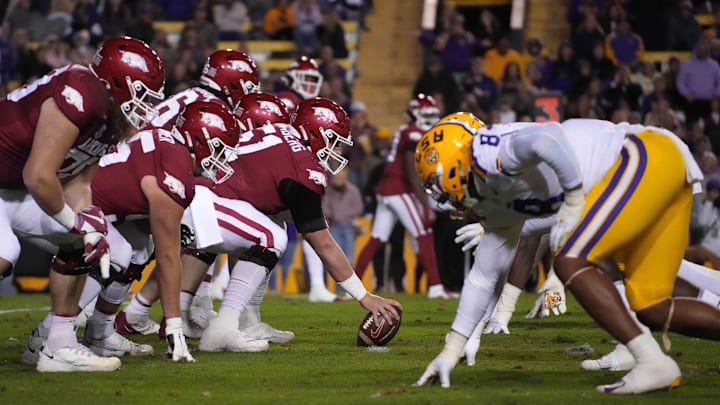Poaching players with NIL money has become the worst-kept secret in college football. Nearly every major program in the country is doing it. Through official means or entities not associated with the program, players are contacted throughout the offseason with NIL offers, making it hard for college coaches to land, and keep recruits. With a virtually unrestricted transfer portal, it’s almost impossible.
Some coaches embrace the chaos (not the cheating, necessarily), like Lane Kiffin at Ole Miss. Others are much less accepting of it, or downright against it, like Dabo Swinney at Clemson. If you compare the year-over-year success of Ole Miss and Clemson since NIL became legal, you can see which side is winning.
On the Smothered & Covered Podcast, Barrett Sallee explains the importance of, at least, keeping up the act so players don’t think the program is cheap or broke.
Realities of NIL
Arkansas isn’t immune to dealing with the day-to-day bombard of potential poachers. The Razorbacks’ offensive line coach, Eric Mateos, sat down on the Coaches and the Mouth podcast recently, and shed some light on the situation.
“I had some unbelievable text messages from transfers in the first recruiting cycle,” said Mateos. “You're just like, ‘Hey I'm coach Mateos. Would you like to get on a on a call sometime today?’ ‘Coach, hey I'm looking for this,’ Like, what, this is the opening statement? I'm like ‘no thanks,’” It’s no surprise that players are money-focused. That’s the goal, after all. The problem is that some programs are willing to pay for it, and they’re always searching for the next prospect.
Mateos also talked about how Fernando Carmona has already received offers to jump into the portal, “You know, our left tackle right now has already got guys trying to steal him from us. He just got here in January and there's already guys trying to steal him.” Luckily, Carmona isn’t going anywhere.
“I called him [and] I was like, ‘Hey man, I'm I know people are coming after you, trying to get you to leave again.’ He's like, ‘Coach, you ain't got to worry about nothing. I'm riding with you.’ I knew he would say that, but as a coach, you just live in this constant state of paranoia now that you can't help, you know…”
The paranoia is understandable, knowing just how many ways athletes are contacted. Mateos explained a call that he had that left him astounded. “I had somebody tell me two days ago that there was a collective from a university calling kids at another school who are not in the portal and offering them money to go into the portal… the collective is recruiting players,” said Mateos.
The NCAA has done relatively nothing to quash the tampering from outside entities, such as collectives. And why should they? It’s a losing battle. Just a couple of months ago, the NCAA lost another lawsuit that allowed collectives in eastern Tennessee and western Virginia to reach out to high school prospects during the recruitment process and offer NIL deals. Not contacting athletes in college but high school athletes. How big of a stretch is it to apply that ruling to college programs?
The thing with NIL is — just like pros — not only athletes are looking to make a buck. Student-athletes can now sign with sports agents, but the rules that pro leagues make to regulate them are nonexistent at the college level. “You hear rumors and agents — you know, now they all got agents — agents talking,” said Mateos.
“These agents don't even need to be NFL PA certified. Like the thing with NFL agents, they all got to be certified through the Players Association. These dudes are just like, got an associate degree and lived down the street from Johnny and said, ‘Hey, Johnny. I'll be your agent.’ You're like, all right, you know. Some of them are doing it the right way. It's not a blanket statement, but that's the challenge really…”
How does he overcome it?
Recruiting players that are only there for the money is a big fear for most coaches. That might be why some are so against NIL. However, unlike Bryan Kelly’s comments about not buying players, Mateos has threaded the needle by creating an environment that makes players want to be at Arkansas but also compensates those players.
“How do you withstand the hurricane of all this illegal recruiting and wild lies that’s going on? Well, you have a good foundation, you know, and you're not gonna be able to keep everybody, and some, you know, at some point, it's going to not go your way,” said Mateos when asked about troubles of recruiting today.
“The challenge that you're referring to really is how do you keep the unit, a unit… how do you manage people, kind of trying to come get your guys?” said Mateos. “I guess my goal [is that] the Players love playing here at Arkansas, they love playing for me, and then they love playing with each other, [so] that some of the cheating that’s going on doesn't really phase them.”
He wants to create an environment that produces guys like Carmona. Guys that are talented, loyal, and want to play for Arkansas. Then he wants to compensate them for it. “I think it's my job to make sure that I'm bringing the right people in that, you know, deserve to profit off their name, image, and likeness, but also, guys that aren't so consumed with it.”
